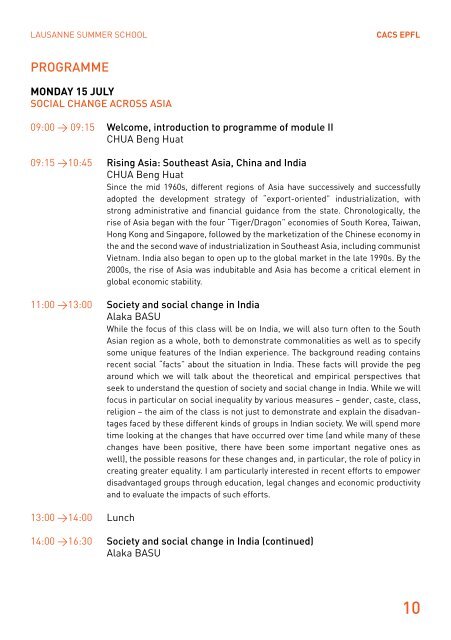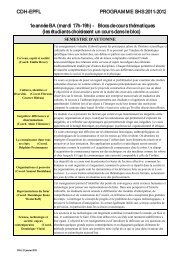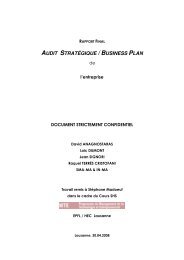here - CDH - EPFL
here - CDH - EPFL
here - CDH - EPFL
You also want an ePaper? Increase the reach of your titles
YUMPU automatically turns print PDFs into web optimized ePapers that Google loves.
LAUSANNE SUMMER SCHOOL<br />
CACS <strong>EPFL</strong><br />
PROGRAMME<br />
Monday 15 July<br />
Social change across Asia<br />
09:00 > 09:15 Welcome, introduction to programme of module II<br />
Chua Beng Huat<br />
09:15 >10:45 Rising Asia: Southeast Asia, China and India<br />
Chua Beng Huat<br />
Since the mid 1960s, different regions of Asia have successively and successfully<br />
adopted the development strategy of “export-oriented” industrialization, with<br />
strong administrative and financial guidance from the state. Chronologically, the<br />
rise of Asia began with the four “Tiger/Dragon” economies of South Korea, Taiwan,<br />
Hong Kong and Singapore, followed by the marketization of the Chinese economy in<br />
the and the second wave of industrialization in Southeast Asia, including communist<br />
Vietnam. India also began to open up to the global market in the late 1990s. By the<br />
2000s, the rise of Asia was indubitable and Asia has become a critical element in<br />
global economic stability.<br />
11:00 >13:00 Society and social change in India<br />
Alaka Basu<br />
While the focus of this class will be on India, we will also turn often to the South<br />
Asian region as a whole, both to demonstrate commonalities as well as to specify<br />
some unique features of the Indian experience. The background reading contains<br />
recent social “facts” about the situation in India. These facts will provide the peg<br />
around which we will talk about the theoretical and empirical perspectives that<br />
seek to understand the question of society and social change in India. While we will<br />
focus in particular on social inequality by various measures – gender, caste, class,<br />
religion – the aim of the class is not just to demonstrate and explain the disadvantages<br />
faced by these different kinds of groups in Indian society. We will spend more<br />
time looking at the changes that have occurred over time (and while many of these<br />
changes have been positive, t<strong>here</strong> have been some important negative ones as<br />
well), the possible reasons for these changes and, in particular, the role of policy in<br />
creating greater equality. I am particularly interested in recent efforts to empower<br />
disadvantaged groups through education, legal changes and economic productivity<br />
and to evaluate the impacts of such efforts.<br />
13:00 >14:00 Lunch<br />
14:00 >16:30 Society and social change in India (continued)<br />
Alaka Basu<br />
10












